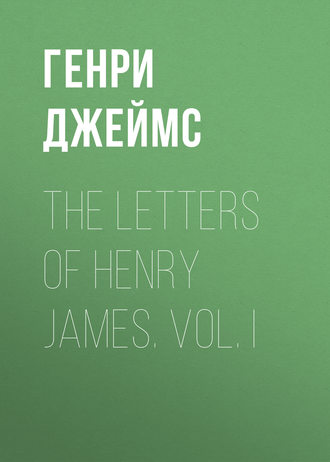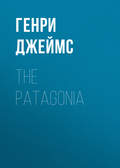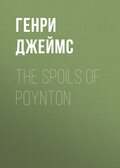
Генри Джеймс
The Letters of Henry James. Vol. I
To Robert Louis Stevenson
Stevenson, writing to H. J. from Vailima, June 17, 1893, announced that he was sending a photograph of his wife. "It reminds me of a friend of my grandmother's who used to say when talking to younger women, 'Aweel, when I was young, I wasnae just exactly what ye wad call bonny, but I was pale, penetratin', and interestin'.'" (Letters to his Family and Friends.)
34 De Vere Gardens, W.August 5th, 1893.
My dear Louis,
I have a most charming and interesting letter, and a photographic representation of your fine head which I cannot so unrestrictedly commend, to thank you for. The portrait has its points as a memento, but they are not fine points as a likeness. I remember you, I think of you, I evoke you, much more plastically. But it was none the less liberal and faithful of you to include me in the list of fond recipients. Your letter contained all sorts of good things, but best of all the happy news of your wife's better condition. I rejoice in that almost obstreperously and beg you to tell her so with my love. The Sydney photograph that you kindly announce (of her) hasn't come, but I impatiently desire it. Meanwhile its place is gracefully occupied by your delightful anecdote of your mother's retrospective Scotch friend—the pale, penetratin' and interestin' one. Perhaps you will permit me to say that it is exquisitely Scotch; at any rate it moves altogether in the highest walks of anecdote.
I get, habitually, the sympathetic infection, from Colvin, of so much general uneasiness and even alarm about you, that it is reassuring to find you apparently incommoded by nothing worse than the privation of liquor and tobacco. "Nothing worse?" I hear you echo, while you ask to what more refined savagery of torture I can imagine you subjected. You would rather perhaps—and small blame to you—perish by the sword than by famine. But you won't perish, my dear Louis, and I am here to tell you so. I should have perished—long ago—if it were mortal. No liquor—to speak of—passes my wasted lips, and yet they are capable of the hypocrisy of the sigh of resignation. I am very, very sorry for you—for I remember the genial tray which in the far-off, fabulous time used to be placed, as the evening waxed, under the social lamp at Skerryvore. The evenings wax at Vailima, but the tray, I gather, has waned. May this heavy trial be lightened, and, as you missionaries say, be even blessed to you. It wounds, I repeat, but it doesn't kill—more's the pity. The tobacco's another question. I have smoked a cigarette—at Skerryvore; and I shall probably smoke one again. But I don't look forward to it. However, you will think me objectionably destitute of temperament. What depresses me much more is the sad sense that you receive scarcely anything I send you. This, however, doesn't deter me from posting you to-day, registered, via San Francisco (it is post-day,) a volume of thin trifles lately put forth by me and entitled Essays in London and Elsewhere. It contains some pretty writing—not addressed to the fishes. My last letter to you, to which yours of June 17th [was a reply]—the only dated one, dear Louis, I ever got from you!—was intended to accompany two other volumes of mine, which were despatched to you, registered, via San F., at the same moment (The Real Thing and The Private Life.) Yet neither of these works, evidently, had reached you when you ask me not to send you the former (though my letter mentioned that it had started,) as you had ordered it. It is all a mystery which the fishes only will have sounded. I also post to you herewith Paul Bourget's last little tale (Un Scruple,) as to which nothing will induce me to utter the faintest rudiments of an opinion. It is full of talent (I don't call that a rudiment,) but the French are passing strange. I am very glad to be able to send you herewith enclosed a petit mot from the said Paul Bourget, in response to your sense of outrage at his too-continuous silence.... His intentions, I can answer for it, had been the best; but he leads so migratory a life that I don't see how any intention can ever well fructify. He has spent the winter in the Holy Land and jumps thence in three weeks (from Beyrout) to his queer American expedition. A year ago—more—he earnestly asked me (at Siena) for your address. I as eagerly gave it to him—par écrit—but the acknowledgment that he was then full of the desire to make to you succumbed to complex frustrations. Now that, at last, here it is, I wish you to be able to read it! But you won't. My hand is the hand of Apollo to it.
I have been at the sea-side for six weeks, and am back in the empty town mainly because it is empty. My sea-side is the sordid sands of Ramsgate—I see your coral-reefs blush pink at the vulgarity of the name. The place has for me an unutterable advantage (in the press of working-weeks) which the beach of Falesà would, fortunately, not have—that of being full of every one I don't know. The beach of Falesà would enthrall but sterilize me—I mean the social muse would disjoint the classic nose of the other. You will certainly think me barren enough as I am. I am really less desiccated than I seem, however, for I am working with patient subterraneity at a trade which it is dishonour enough to practise, without talking about it: a trade supremely dangerous and heroically difficult—that credit at least belongs to it. The case is simplified for me by the direst necessity: the book, as my limitations compel me to produce it, doesn't bring me in a penny. Tell it not in Samoa—or at least not in Tahiti; but I don't sell ten copies!—and neither editors nor publishers will have anything whatever to say to me. But I never mention it—nearer home. "Politics," dear politician—I rejoice that you are getting over them. When you say that you always "believed" them beastly I am tempted to become superior and say that I always knew them so. At least I don't see how one can have glanced, however cursorily, at the contemporary newspapers (I mean the journal of one's whole time,) and had any doubt of it. The morals, the manners, the materials of all those gentlemen are writ there more large than any record is elsewhere writ, and the impudence of their airs and pretensions in the presence of it revolts even the meekness of a spirit as resigned to everything as mine. The sordid fight in the House of Commons the other night seemed to me only a momentary intermission of hypocrisy. The hypocrisy comes back with the pretended confusion over it. The Lives of the Stevensons (with every respect to them) isn't what I want you most to write, but I would rather you should publish ten volumes of them than another letter to the Times. Meanwhile I am languishing for Catriona—and the weeks follow and I must live without you. It isn't life. But I am still amicably yours and your wife's and the insidious Lloyd's,
HENRY JAMES.
To Robert Louis Stevenson
34 De Vere Gardens, W.October 21st [1893.]
My dear Louis,
The postal guide tells me, disobligingly, that there is no mail to you via San Francisco this month and that I must confide my few lines to the precarious and perfidious Hamburg. I do so, then, for the plain reason that I can no longer repress the enthusiasm that has surged within me ever since I read Catriona. I missed, just after doing so, last month's post, and I was infinitely vexed that it should not have conveyed to you the freshness of my rapture. For the said Catriona so reeks and hums with genius that there is no refuge for the desperate reader but in straightforward prostration. I'm not sure that it's magnanimous of you to succeed so inconsiderately—there is a modesty in easy triumph which your flushed muse perhaps a little neglects.—But forgive that lumbering image—I won't attempt to carry it out. Let me only say that I don't despatch these ineffectual words on their too watery way to do anything but thank you for an exquisite pleasure. I hold that when a book has the high beauty of that one there's a poor indelicacy in what simple folk call criticism. The work lives by so absolute a law that it's grotesque to prattle about what might have been! I shall express to you the one point in which my sense was conscious of an unsatisfied desire, but only after saying first how rare an achievement I think the whole personality and tone of David and with how supremely happy a hand you have coloured the palpable women. They are quite too lovely and everyone is running after them. In David not an error, not a false note ever; he is all of an exasperating truth and rightness. The one thing I miss in the book is the note of visibility—it subjects my visual sense, my seeing imagination, to an almost painful underfeeding. The hearing imagination, as it were, is nourished like an alderman, and the loud audibility seems a slight the more on the baffled lust of the eyes—so that I seem to myself (I am speaking of course only from the point of view of the way, as I read, my impression longs to complete itself) in the presence of voices in the darkness—voices the more distinct and vivid, the more brave and sonorous, as voices always are—but also the more tormenting and confounding—by reason of these bandaged eyes. I utter a pleading moan when you, e.g., transport your characters, toward the end, in a line or two from Leyden to Dunkirk without the glint of a hint of all the ambient picture of the 18th century road. However, stick to your own system of evocation so long as what you positively achieve is so big. Life and letters and art all take joy in you.
I am rejoiced to hear that your wife is less disturbed in health and that your anxieties are somewhat appeased. I don't know how sufficiently to renew, to both of you, the assurance of all my friendliest sympathy. You live in conditions so unimaginable and to the tune of experience so great and so strange that you must forgive me if I am altogether out of step with your events. I know you're surrounded with the din of battle, and yet the beauty you produce has the Goethean calm, even like the beauty distilled at Weimar when the smoke was over Jena. Let me touch you at least on your bookish side and the others may bristle with heroics. I pray you be made accessible some day in a talkative armchair by the fire. If it hadn't been for Catriona we couldn't, this year, have held up our head. It had been long, before that, since any decent sentence was turned in English. We grow systematically vulgarer and baser. The only blur of light is that your books are tasted. I shall try to see Colvin before I post this—otherwise I haven't seen him for three months. I've had a summer of the British seaside, the bathing machine and the German band. I met Zola at luncheon the day before he left London and found him very sane and common and inexperienced. Nothing, literally nothing, has ever happened to him but to write the Rougon-Macquart. It makes that series, I admit, still more curious. Your tour de force is of the opposite kind. Renew the miracle, my dear Louis, and believe me yours already gaping,
HENRY JAMES.
P.S. I have had to keep my poor note several days—finding that after all there is, thank heaven, a near post by San Francisco. Meanwhile I have seen Colvin and made discreetly, though so eagerly, free of some of your projects—and gyrations! Trapezist in the Pacific void!
"Catriona" is more and more BEAUTIFUL. There's the rub!
H.J.
To William James
The incident referred to in the following letter was the unexpected miscarriage of one of H. J.'s theatrical schemes. Meanwhile Guy Domville had been accepted for future production at the St. James's Theatre.
34 De Vere Gardens, W.Dec. 29th, 1893.
I rejoice greatly in Alice's announcement (which you, William, coyly don't mention) of the presidency of the [Society for Psychical Research]. I hope it's all honour and kudos and pleasantness, without a tax of botherations. I wish I could give you some correspondingly good tidings of my own ascensory movement; but I had a fall—or rather took a jump—the other day (a month ago) of which the direction was not vulgarly—I mean theatrically and financially—upward. You are so sympathetic about the whole sordid development that I make a point of mentioning the incident.... It was none the less for a while a lively disgust and disappointment—a waste of patient and ingenious labour and a sacrifice of coin much counted on. But à la guerre comme à la guerre. I mean to wage this war ferociously for one year more—1894—and then (unless the victory and the spoils have by that become more proportionate than hitherto to the humiliations and vulgarities and disgusts, all the dishonour and chronic insult incurred) to "chuck" the whole intolerable experiment and return to more elevated and more independent courses. The whole odiousness of the thing lies in the connection between the drama and the theatre. The one is admirable in its interest and difficulty, the other loathsome in its conditions. If the drama could only be theoretically or hypothetically acted, the fascination resident in its all but unconquerable (circumspice!) form would be unimpaired, and one would be able to have the exquisite exercise without the horrid sacrifice. However, Alexander's preparations of my play are going on sedulously, as to which situation and circumstances are all essentially different. He will produce me at no distant date, infallibly.... But meanwhile I am working heroically, though it every month becomes more difficult to give time to things of which the pecuniary fruit is remote. Excuse these vulgar confidences. I have come to hate the whole theatrical subject.... Don't write to condole with me about the business. I don't in the least "require" it. May the new year not have too many twists and turns for you, but lie straight and smooth before you.
Evermore yourHENRY.
To Julian R. Sturgis
34 De Vere Gardens, W.Sunday [1893].
My dear Julian,
I wish I had your gift of facile and fascinating rhyme: I would turn it to account to thank you for your note and your sympathy. Yes, Ibsen is ugly, common, hard, prosaic, bottomlessly bourgeois—and with his distinction so far in, as it were, so behind doors and beyond vestibules, that one is excusable for not pushing one's way to it. And yet of his art he's a master—and I feel in him, to the pitch of almost intolerable boredom, the presence and the insistence of life. On the other hand his mastery, so bare and lean as it is, wouldn't count nearly as much in any medium in which the genus was otherwise represented. In our sandy desert even this translated octopus (excuse my confusion of habitats!!) sits alone, and isn't kept in his place by relativity. "Thanks awfully" for having retained an impression from the few Tales. My intentions are mostly good. I hope to knock at your door this p.m.
Yours always,HENRY JAMES.
To George du Maurier.
An article by H. J. on George du Maurier had appeared in Harper's Weekly, April 14, 1894.
Casa Biondetti, San Vio 715,Venice.Thursday [May 1894].
Only see, my dear Kikaccio, to what my thick-and-thin espousal of your genius exposes me at the hands of an unknown American female. Guileless, stupid, muddled, distracted, well-meaning, but slightly hypocritical American female!—Don't return, of course, the letter. I haven't seen the little cochonnerie I wrote about you, bothered, preoccupied with other work, more and more incapable of writing that sort of thing gracefully and properly—in the muddle and confusion of my coming abroad; and I hope you haven't, by the trop bons soins of McIlvaine, seen it either. But I bless it in that through arousing the American female my clumsy 'critique' has given me the occasion to salutarvi tutti. Are you on the hill or in the vale? I give it up, only pressing you all to my bosom wherever you are. Trilby goes on with a life and charm and loveability that gild the whole day one reads her. It's most delightfully and vividly talked! And then drawn!—no, it isn't fair. Well, I'm in Venice and you're not—so you've not got quite everything. It has been cold and wet; but Italy is always Italy—and the only thing really to be depended on quand même. I hope you have not returned to Hampstead, if you have returned, without tying your legs somewhere or other to Bayswater. I hope that everything has been well with you all—you yourself most well. It makes me homesick to write to you—but it is the only thing that does. I trust fame and flattery and flowers flow in upon you with the revolving Harpers.... Write me a word—tell me you don't hate me. I seem to remember rather disagreeably what I wrote about you.
Yours, caro mio, always,HENRY JAMES.
To William James
H. J. had just received from his brother the diary which their sister had kept during her last years in England.
Grand Hotel, Rome.May 28th, 1894.
My dear William:—my dear Alice:—
I wrote you a scrabbly note from Ravenna a few days since—but I must follow it up, without delay, with something better. I came on here an hour afterwards, and shall remain till June 1st or 2nd. I find Rome deliriously cool and empty, and still very pleasing in spite of the "ruining" which has been going on so long and of which one has heard so much, i.e., the redemption and cockneyfication of the ruins. This "changes" immensely—as everyone says; but I find myself, I am afraid, so much more changed—since I first knew and rhapsodized over it, that I am bound in justice to hold Rome the less criminal of the two. I am thinking a little about going down—if the coolness lasts—for three or four days to Naples; but I haven't decided. I feel rather hard and heartless to be prattling about these touristries to you, with the sad picture I have had these last weeks of your—William's—state of suffering. But it is only a way of saying that that state makes one feel it to be the greater duty for me to be as well as I can. Absit omen! Your so interesting letter of the 6th dictated to Alice speaks of the possibility of your abscess continuing not to heal—but I trust the event has long ere this reassured, comforted and liberated you. Meanwhile may Alice have smoothed your pillow as even she has never smoothed it before.... As regards the life, the power, the temper, the humour and beauty and expressiveness of the Diary in itself—these things were partly "discounted" to me in advance by so much of Alice's talk during her last years—and my constant association with her—which led me often to reflect about her extraordinary force of mind and character, her whole way of taking life—and death—in very much the manner in which the book does. I find in its pages, for instance, many things I heard her say. None the less I have been immensely impressed with the thing as a revelation of a moral and personal picture. It is heroic in its individuality, its independence—its face-to-face with the universe for and by herself—and the beauty and eloquence with which she often expresses this, let alone the rich irony and humour, constitute (I wholly agree with you) a new claim for the family renown. This last element—her style, her power to write—are indeed to me a delight—for I have had many letters from her. Also it brings back to me all sorts of things I am glad to keep—I mean things that happened, hours, occasions, conversations—brings them back with a strange, living richness. But it also puts before me what I was tremendously conscious of in her life-time—that the extraordinary intensity of her will and personality really would have made the equal, the reciprocal, life of a "well" person—in the usual world—almost impossible to her—so that her disastrous, her tragic health was in a manner the only solution for her of the practical problem of life—as it suppressed the element of equality, reciprocity, etc. The violence of her reaction against her British ambiente, against everything English, engenders some of her most admirable and delightful passages—but I feel in reading them, as I always felt in talking with her, that inevitably she simplified too much, shut up in her sick room, exercised her wondrous vigour of judgment on too small a scrap of what really surrounded her. It would have been modified in many ways if she had lived with them (the English) more—seen more of the men, etc. But doubtless it is fortunate for the fun and humour of the thing that it wasn't modified—as surely the critical emotion (about them,) the essence of much of their nature, was never more beautifully expressed. As for her allusions to H.—they fill me with tears and cover me with blushes.... I find an immense eloquence in her passionate "radicalism"—her most distinguishing feature almost—which, in her, was absolutely direct and original (like everything that was in her,) unreflected, uncaught from entourage or example. It would really have made her, had she lived in the world, a feminine "political force." But had she lived in the world and seen things nearer she would have had disgusts and disillusions. However, what comes out in the book—as it came out to me in fact—is that she was really an Irishwoman; transplanted, transfigured—yet none the less fundamentally national—in spite of her so much larger and finer than Irish intelligence. She felt the Home Rule question absolutely as only an Irishwoman (not anglicised) could. It was a tremendous emotion with her—inexplicable in any other way—but perfectly explicable by "atavism." What a pity she wasn't born there—and had her health for it. She would have been (if, always, she had not fallen a victim to disgust—a large "if") a national glory! But I am writing too much and my late hindrances have left me with tremendous arrears of correspondence. I thank you, dear Alice, caramente, for your sweet letter received two or three weeks before William's. I crudely hope you won't let your house—so as to have it to go to in the summer. Otherwise what will become of you. I dig my nose into the fleshiest parts of the young Francis. Tell Peggy I cling to her—and to Harry too, and Billy not less.... I haven't sent you "The Yellow Book"—on purpose; and indeed I have been weeks and weeks receiving a copy of it myself. I say on purpose because although my little tale which ushers it in ("The Death of the Lion") appears to have had, for a thing of mine, an unusual success, I hate too much the horrid aspect and company of the whole publication. And yet I am again to be intimately, conspicuously associated with the 2d number. It is for gold and to oblige the worshipful Harland (the editor). Wait and read the two tales in a volume—with 2 or 3 others. Above all be debout and forgive the long reticence of your affectionate
HENRY.






